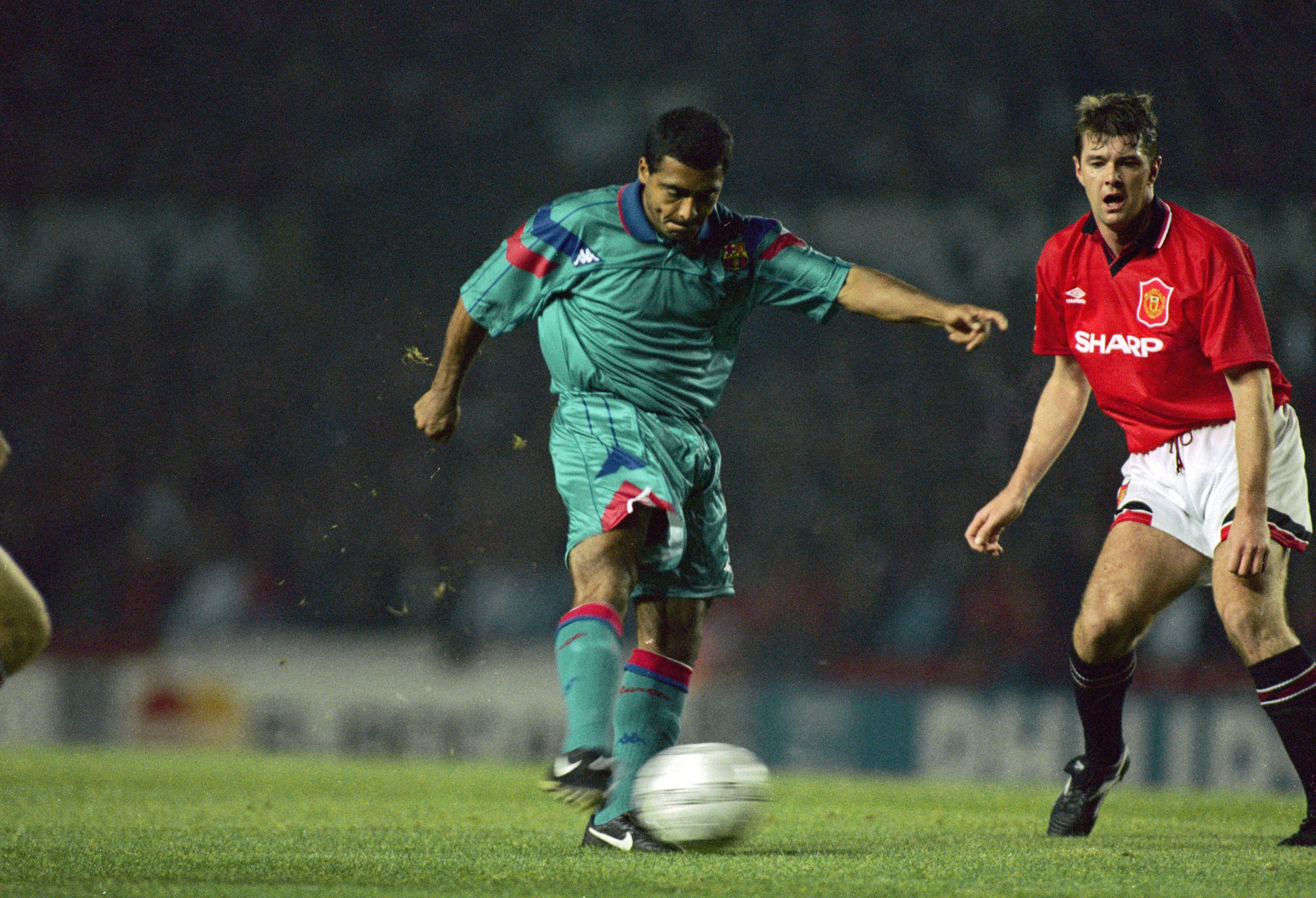How an old rule can bring a new solution to football’s competition crisis
The foreign player rule in the 1990s allowed for greater distribution of talent and, as Miguel Delaney argues, more variety and depth across European football


Your support helps us to tell the story
This election is still a dead heat, according to most polls. In a fight with such wafer-thin margins, we need reporters on the ground talking to the people Trump and Harris are courting. Your support allows us to keep sending journalists to the story.
The Independent is trusted by 27 million Americans from across the entire political spectrum every month. Unlike many other quality news outlets, we choose not to lock you out of our reporting and analysis with paywalls. But quality journalism must still be paid for.
Help us keep bring these critical stories to light. Your support makes all the difference.
It is always the last week of the Champions League group stages that highlights the first problem that football should be solving.
There is not much peril to any of the final games. As many as 12 of the 16 knockout places have already been confirmed, with 10 of those among the 12 wealthiest in the competition.
It’s a far cry from the 1990s, when there was never a single year where even half the final games were dead rubbers.
The problem clearly goes beyond this season, or even the structure of the Champions League itself. It is not something that a new “Swiss model” is going to solve. You only have to look around Europe’s domestic competitions. The Premier League currently has the top three streaking away, on top of another broadcasting deal that puts it far ahead of the rest of European football. Paris Saint-Germain are already 11 points clear of the rest of Ligue 1. Bayern Munich have again just suffocated any potential excitement about a real title race in Germany, by beating Dortmund and ensuring that no one seriously doubts they will win a 10th successive title.
A 10th successive title. The words alone should be enough to prompt an inquest as to how this is addressed, especially when the problem is so obvious.
It is a dismal financial disparity, that is destroying football’s inherent unpredictability.
Some at the top of the game do badly want to solve this, but don’t know where to turn.
One potential solution may come from looking back into the Champions League’s own history – towards those days of the 1990s.
It might be time to consider the return of the foreign player rule.
It is one regulation that would actually bring multiple benefits, because of the specific nature of the problem.
The abolition of the rule, which allowed three players from outside a club’s home country and two “assimilated” youth products, was one of the huge changes that came with the Bosman ruling in 1995. Along with players being able to move freely when their contracts ended, the European Court of Justice (ECJ) decreed that European Union clubs could hire any number of EU players, with that eventually extended to signings from all over the world.
The rule had caused particular problems for British clubs, especially with how Irish players – at that point a mainstay in the Premier League’s top teams – were considered foreign. Sir Alex Ferguson constantly had to make huge selection calls, with the worst coming when Peter Schmeichel was dropped for Gary Walsh for that notorious 4-0 Manchester United defeat to Barcelona in Camp Nou.

The Spanish champions’ own foreign stars, Romario and Hristo Stoichkov, did most of the damage.
Back then, British clubs just couldn’t dream of affording that kind of talent. The Bosman ruling was one of a few key factors that changed this.
Rangers rejoiced at the rule change, since the Scottish champions had been constantly lobbying for exactly that.
“We are delighted with the verdict,” vice-chairman Donald Findlay QC said at the time. “It means that our foreign players are now just Rangers players, pure and simple, and are available for every game.”
What it instead did was ensure a football world where players of the standard of Danish playmaker legend Brian Laudrup or the former Ukraine midfielder Oleksiy Mykhaylychenko were just unavailable to Rangers, because they wouldn’t drop to a league of Scotland’s status. These clubs have been among the biggest victims of the Bosman ruling.
The new rules essentially created the most open and biggest labour market in the world. As football historian David Goldblatt has argued to The Independent, it was a more global market than even international banking.

The idea might have been that it just made the football world open and entirely democratic for any individual planet. The actual consequence has been that it funnels the game towards the wealthiest, while making them wealthier.
The richest clubs were suddenly completely free to accumulate as much of the best talent as they could afford, hollowing out everyone else, and making themselves more commercially attractive.
A self-perpetuating cycle had started, getting worse at every turn. It is why the situation wasn’t so bad even in the mid-2000s, but began to really accelerate in the last decade. We went from a situation where big clubs could build strong squads to one where they build super squads. There was literally no limit on the talent they could bring in, bar budget. That had never been seen in football before.
Even Jean-Marc Bosman, the man who sparked much of this, expressed regret over the effects in an interview with The Guardian in 2015.
“Now the 25 or so richest clubs transfer players for astronomical sums and smaller clubs cannot afford to buy at those prices,” Bosman said. “So the 25 pull further and further away from the rest, deepening the gap between big and small. That was not the aim of the Bosman ruling.”
Its effect has since been even worse, though. You can no longer even say it is 25 clubs. It is probably about 12 to 15.

Naturally, those 12-15 are entirely resistant to the idea of greater redistribution of resources in football. The push for the Super League shows that.
It is why a new foreign player rule could offer an alternative solution. If you can’t redistribute the money, you can redistribute what it buys. You can ensure a greater spread of the talent.
At a stroke, a new rule would prevent big clubs bringing in as much talent, while slowing down their expenditure. They would have to be more calculated about signings, and who they pick.
This would by default ensure more players stay at smaller clubs for that bit longer, and that there is more higher talent available to them. It of course doesn’t solve the issue of financial disparity but it does eat into the problem by a significant amount. It would just increase competitive balance in football that bit more.
There would also be other benefits, not least to the vitality and variety of the game.
More players would extend their time at their initial clubs or home countries, enriching the domestic leagues. This is essential since the vast majority now find it impossible to compete with the major competitions due to the TV markets not being big enough, with some of the “big five” even finding it impossible to keep up with the Premier League. The direction of travel is all too clear. It needs diversion, and regulation.
A foreign player rule just stems the speed and flow of the brain drain by a game-changing amount.
England would have more money, for example, but it just wouldn’t be able to bring in a greater extent of the players. You wouldn’t see an Ajax 2019 – Champions League semi-finalists – or a Porto 2004 – European champions that season – asset-stripped as quickly either.
It would genuinely be better for every national association, too. It would be for the health of the sport.
As well as providing a boost to the majority of European leagues, young players from every country would be given more space to develop.
For the best effect of this, you only have to consider most of eastern Europe. Communist states used to have a rule where players couldn’t leave until they were in their late twenties. This argument obviously isn’t a defence for the wider political philosophy of the eastern bloc, but the sporting effect was clear.
Because their clubs could keep players longer, they were properly competitive. The Georgian club Dinamo Tbilisi of the early 1980s are still considered one of the best sides in those first four decades of European history, in a way that is simply impossible now.
A foreign player rule could at least bring some of the same effects.
A frequent counter-argument has been that it would deny young players the education process that comes with the elevation of quality from foreign signings. This need not be taken away, though. The rule does not need to be as severe as in the mid-1990s. More than five starters could be allowed. It just needs to be sufficient to stem the drastic flow of talent in the game, so it could improve competition.
That would also ensure it isn’t a restraint of trade.
A reasonable legal argument could similarly be made to the ECJ that is in the interests of the health of the sport, especially given the trajectory of the game. There should really be deep concern that the continent’s most popular cultural pursuit has been so distorted by money, and the very principles of business.
It is crying out for greater regulation.
The main problem is that the big clubs will remain so resistant. You only have to look at the responses to England’s fan-led review, not to mention the apparently meek acceptance of Bayern’s damaging superiority in Germany.
This has been one of the reasons the game has got to this point. Almost no one looks at it in terms of football as a whole. Good regulations within one country become irrelevant because their clubs have to compete with those from other leagues.
It’s just this is becoming too big a problem. An old rule may offer a new solution, with multiple benefits.

Join our commenting forum
Join thought-provoking conversations, follow other Independent readers and see their replies
Comments